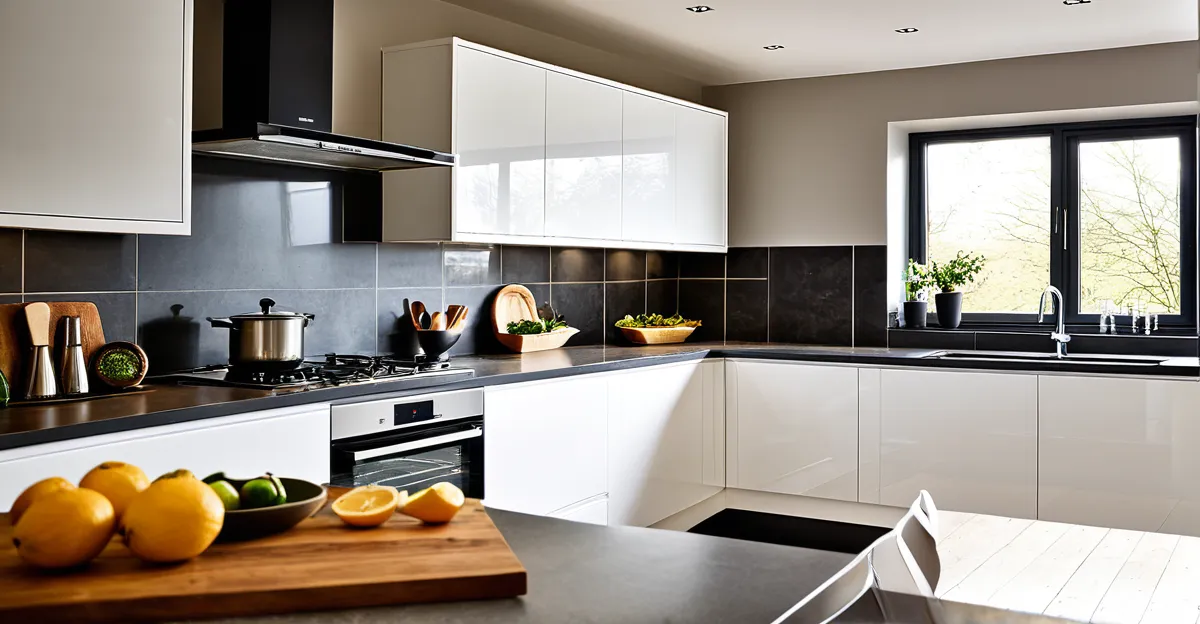Transformative Kitchen Design Trends Shaping the UK Market
In the evolving landscape of UK kitchen design trends, future kitchen styles lean heavily towards functionality blended with striking aesthetics. Expect a shift from traditional bulky cabinetry to sleek, handleless designs that offer clean lines and maximize storage efficiency. Soft, muted colour palettes—think slate grey, sage green, and warm beige—dominate interiors, creating a calming yet sophisticated atmosphere.
Layout innovation is vital. Open-plan kitchens fused with dining and living areas reflect modern UK lifestyle needs, prioritizing social interaction and family cohesion. Island units with integrated appliances are increasingly popular, serving as multifunctional hubs for cooking, dining, and even working.
This might interest you : What Are the Latest Trends in British Kitchen Appliances?
The UK’s distinctive architecture and compact urban homes inspire kitchen designs that optimize space without sacrificing style. Designers draw from local materials, such as natural wood and stone, to complement heritage homes while incorporating smart technology for energy efficiency and convenience.
Notable examples from leading UK interior design sources showcase how these trends coexist harmoniously—blending contemporary minimalism with timeless British character. This approach ensures kitchens remain not only visually compelling but also tailored to the dynamic daily lives of UK residents, underscoring the transformative impact of current trends on future kitchen styles.
Also read : How Might Emerging Trends Reshape the Future of UK Kitchens?
Smart Kitchen Technology: Integrating Innovation and Convenience
Smart kitchen technology in the UK is transforming how households approach daily cooking and meal preparation. Connected appliances like smart ovens, refrigerators, and dishwashers enable users to monitor and control devices remotely, increasing convenience and efficiency. For example, a smart oven can preheat itself based on a recipe app’s instructions, streamlining cooking without constant supervision.
Current kitchen innovation trends focus on automation and seamless integration. Voice-activated assistants allow hands-free control, while sensors detect food freshness, helping reduce waste—a particularly valued feature in eco-conscious UK homes. Experts emphasize that convenience is at the heart of these developments, enabling users to save time and enjoy more effortless meal prep.
UK-specific regulations ensure these smart appliances meet rigorous safety and energy standards. Brands leading the market in smart kitchen technology UK are recognized for durability and user-friendly interfaces. When choosing connected appliances, consider compatibility with existing smart home ecosystems to maximize benefits. These advances not only enhance efficiency but also encourage healthier, more sustainable cooking habits suited to modern UK lifestyles.
Sustainability and Eco-Conscious Choices in Kitchen Materials
Navigating sustainable kitchen materials UK options means looking beyond aesthetics. Emerging eco-friendly kitchens often incorporate bamboo, reclaimed wood, and recycled glass countertops—each chosen for durability and minimal environmental impact. These materials reduce waste and lower the demand for virgin resources, aligning with green home renovations goals.
Manufacturers in the UK increasingly prioritize sustainable manufacturing and sourcing practices by ensuring timber comes from FSC-certified forests and using low-VOC (Volatile Organic Compounds) finishes. This approach reduces harmful emissions and supports responsible forestry, directly benefiting indoor air quality and ecosystem health.
For practical action, homeowners can easily upgrade to greener kitchens by selecting modular cabinetry made from recycled materials or opting for energy-efficient appliances. Choosing long-lasting, repairable products also decreases landfill waste over time. Combining these choices creates a kitchen environment that is stylish yet mindful of its ecological footprint, demonstrating how sustainability and modern design can coexist beautifully.
Maximising Space: Solutions for Compact UK Kitchens
Smart ideas to transform small spaces
Tackling the challenge of compact kitchens in the UK calls for space-saving kitchen ideas UK that do more than just fit appliances—they maximise every inch. One key approach is utilising space-saving furniture such as slimline cabinets and extendable tables, which blend function without crowding the room. Modular options often adapt seamlessly, letting users customise their storage and work surfaces according to shifting needs.
When it comes to small kitchen solutions, UK designers emphasise clever layout choices. For example, L-shaped or galley kitchens optimise wall space effectively, providing continuous countertops and ample storage while maintaining easy flow. Incorporating vertical storage—from hanging rails to ceiling-height cupboards—frees up precious floor space and keeps essentials within reach.
Efficient kitchen layouts are also enhanced through hidden storage compartments and pull-out units, rendering everyday items accessible but unobtrusive. Lighting design further improves the sense of openness, making compact kitchens feel brighter and roomier. In sum, these innovations create a functional kitchen tailored to the unique compromises of UK homes, blending practicality with stylish solutions that don’t overwhelm limited footprints.
Adapting to Lifestyle: How Social and Cultural Shifts Influence UK Kitchens
Small
The UK kitchen lifestyle trends reveal a strong shift towards multi-functional kitchens that accommodate an evolving family dynamic. Open-plan spaces have become the standard, merging cooking, dining, and living areas seamlessly. This change reflects a desire for connectedness, allowing families to interact while meals are prepared or while working remotely.
As families embrace remote work, kitchens are adapting to serve as informal offices, study areas, and social hubs. The need for family-friendly kitchen design has sparked innovations such as durable surfaces for children, integrated charging stations, and furniture that can shift between casual and formal uses.
For those seeking practical solutions, UK design experts recommend selecting modular furniture and smart storage options. These allow homeowners to easily reconfigure spaces as needs change. Investing in versatile lighting and noise reduction features also supports the multi-use nature of modern kitchens.
Understanding these shifts helps homeowners create spaces that remain functional and inviting. Keeping pace with UK kitchen lifestyle trends means embracing flexibility, which ultimately enhances family life and social experiences in the heart of the home.


